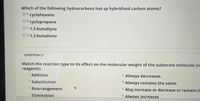
Chemistry
10th Edition
ISBN: 9781305957404
Author: Steven S. Zumdahl, Susan A. Zumdahl, Donald J. DeCoste
Publisher: Cengage Learning
expand_more
expand_more
format_list_bulleted
Question
Please

Transcribed Image Text:**Question 25**
Which compound will react most rapidly with bromobutane to provide the corresponding S<sub>N</sub>2 product?
- A. NaOAc (OAc = acetate)
- B. NaOPh (Ph = phenyl)
- C. NaOH
- D. NaOOH
**Question 26**
Which of the following hydrocarbons has sp hybridized carbon atoms?
- A. cyclohexane
- B. cyclopropane

Transcribed Image Text:**Question 26**
Which of the following hydrocarbons has sp hybridized carbon atoms?
- A. cyclohexane
- B. cyclopropane
- C. 1,3-butadiyne
- D. 1,3-butadiene
---
**Question 27**
Match the reaction type to its effect on the molecular weight of the substrate molecule (no other reagents).
- Addition
- Substitution
- Rearrangement
- Elimination
Options:
- A. Always decreases.
- B. Always remains the same.
- C. May increase or decrease or remain the same.
- D. Always increases.
Expert Solution
This question has been solved!
Explore an expertly crafted, step-by-step solution for a thorough understanding of key concepts.
This is a popular solution
Trending nowThis is a popular solution!
Step by stepSolved in 2 steps with 2 images

Knowledge Booster
Learn more about
Need a deep-dive on the concept behind this application? Look no further. Learn more about this topic, chemistry and related others by exploring similar questions and additional content below.Similar questions
- 9. Determine whether the following drugs comply with Lipinski's rule. Also investigate the "alternative criteria" (rotatable bonds, polar surface area) for both drugs. OH N(CH3)2 HO. OH OH OH O Tetracycline (antibiotic) P=0.04 OH CONH₂ OH N. Naloxone (morphine agonist) P=83arrow_forward||||OH 1.pTs-Cl 2. KCN/DM50 1 1. SOCl₂, pyridine 2. KOH/acetone 1. HCI 2. (CH3)3COK acetone K Jarrow_forwardFigure 3-1 1 А. СНЗ с. CHz CH3 CH-CH-CH3 CH ₂ CH 3 в. н D. CH CH3 . тоен - сненсне енз СнЗarrow_forward
- I. List all the IMFS that are present in a pure sample of substance A below. The Lewis structure of a molecule is shown. H -C C-H | | H II. Draw one example of substance A acting as a H-bond donor with water. Make sure your H- bond starts and ends in the right places. If the molecule can't act as a H-bond donor, write "not possible." II. Draw one example of substance A acting as a H-bond acceptor with water. Make sure your H-bond starts and ends in the right places. If the molecule can't act as a H-bond acceptor, write "not possible." IV. List all the IMF that are present in a pure sample of substance B below. The Lewis structure of a molecule is shown. H H. C N. H H. H V. Compare substance A and substance B. Which would you expect to have the highest boiling point? Briefly explain why (in about 1 sentence). IIC- :O:arrow_forward6 though 8 please fill it inarrow_forward1. LDA, -78°C 2 CHIẾ 1. NaH 2. 1. LDA, -78°C 2. CH_Br 3. LDA, -78°C 4. CH_Br Br 1. NaH 2. Brarrow_forward
arrow_back_ios
arrow_forward_ios
Recommended textbooks for you
 ChemistryChemistryISBN:9781305957404Author:Steven S. Zumdahl, Susan A. Zumdahl, Donald J. DeCostePublisher:Cengage Learning
ChemistryChemistryISBN:9781305957404Author:Steven S. Zumdahl, Susan A. Zumdahl, Donald J. DeCostePublisher:Cengage Learning ChemistryChemistryISBN:9781259911156Author:Raymond Chang Dr., Jason Overby ProfessorPublisher:McGraw-Hill Education
ChemistryChemistryISBN:9781259911156Author:Raymond Chang Dr., Jason Overby ProfessorPublisher:McGraw-Hill Education Principles of Instrumental AnalysisChemistryISBN:9781305577213Author:Douglas A. Skoog, F. James Holler, Stanley R. CrouchPublisher:Cengage Learning
Principles of Instrumental AnalysisChemistryISBN:9781305577213Author:Douglas A. Skoog, F. James Holler, Stanley R. CrouchPublisher:Cengage Learning Organic ChemistryChemistryISBN:9780078021558Author:Janice Gorzynski Smith Dr.Publisher:McGraw-Hill Education
Organic ChemistryChemistryISBN:9780078021558Author:Janice Gorzynski Smith Dr.Publisher:McGraw-Hill Education Chemistry: Principles and ReactionsChemistryISBN:9781305079373Author:William L. Masterton, Cecile N. HurleyPublisher:Cengage Learning
Chemistry: Principles and ReactionsChemistryISBN:9781305079373Author:William L. Masterton, Cecile N. HurleyPublisher:Cengage Learning Elementary Principles of Chemical Processes, Bind...ChemistryISBN:9781118431221Author:Richard M. Felder, Ronald W. Rousseau, Lisa G. BullardPublisher:WILEY
Elementary Principles of Chemical Processes, Bind...ChemistryISBN:9781118431221Author:Richard M. Felder, Ronald W. Rousseau, Lisa G. BullardPublisher:WILEY

Chemistry
Chemistry
ISBN:9781305957404
Author:Steven S. Zumdahl, Susan A. Zumdahl, Donald J. DeCoste
Publisher:Cengage Learning

Chemistry
Chemistry
ISBN:9781259911156
Author:Raymond Chang Dr., Jason Overby Professor
Publisher:McGraw-Hill Education

Principles of Instrumental Analysis
Chemistry
ISBN:9781305577213
Author:Douglas A. Skoog, F. James Holler, Stanley R. Crouch
Publisher:Cengage Learning

Organic Chemistry
Chemistry
ISBN:9780078021558
Author:Janice Gorzynski Smith Dr.
Publisher:McGraw-Hill Education

Chemistry: Principles and Reactions
Chemistry
ISBN:9781305079373
Author:William L. Masterton, Cecile N. Hurley
Publisher:Cengage Learning

Elementary Principles of Chemical Processes, Bind...
Chemistry
ISBN:9781118431221
Author:Richard M. Felder, Ronald W. Rousseau, Lisa G. Bullard
Publisher:WILEY